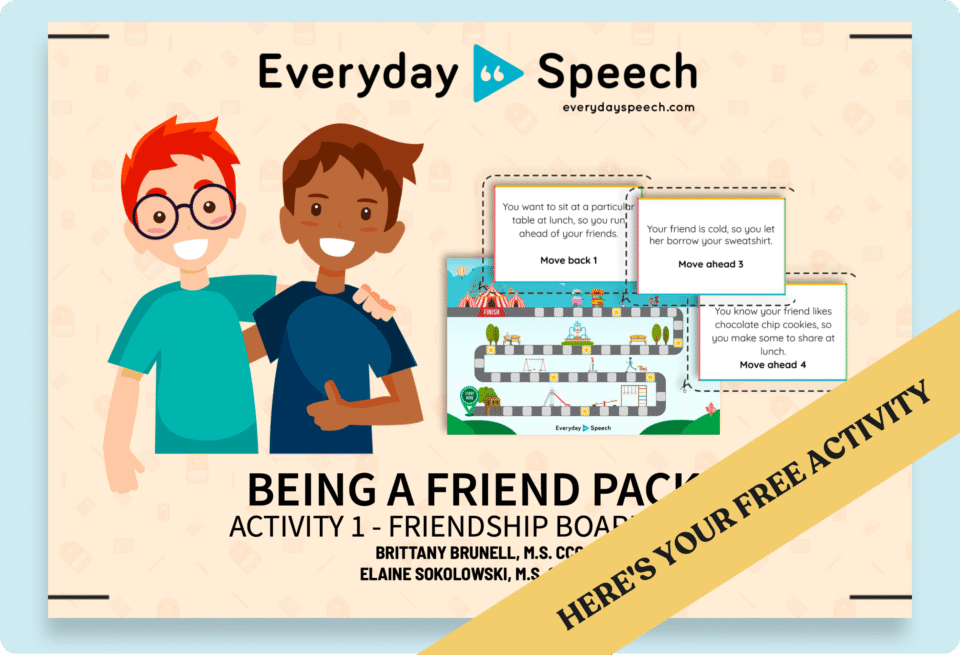Free High School Worksheet: Practicing Self-Reflection
Get free social skills materials
No-prep lessons on self-regulation, emotional recognition, conversation skills, and more.
Sign up hereHigh school students make countless decisions every day. Some are small and forgettable. Others stick with them. But few are encouraged to pause and ask themselves, “What would I do differently next time?”
Related resources:
The Self-Reflection worksheet from Everyday Speech invites students to reflect on how they respond to common situations—and how they might grow from them. It’s a free, printable activity that encourages accountability, emotional awareness, and personal growth.
In this article, we’ll cover:
- Why self-reflection is important during adolescence
- What’s included in the worksheet
- Teaching strategies for middle and high school classrooms
- A link to download the free resource
Download Self-Esteem Activities for Teens
No-prep worksheets to build confidence, reflection, and independence.
Why Teach Self-Reflection in High School?
Self-reflection is one of the most overlooked skills in adolescent development. Yet it plays a critical role in helping students:
- Understand their own behavior
- Learn from mistakes without shame
- Take ownership of their actions
- Build stronger relationships
Without reflection, students may repeat negative patterns or avoid responsibility altogether. With reflection, they begin to see choices as opportunities—to improve, to repair, and to try again.
This is especially important during high school, when students are navigating more independence and higher expectations. Reflection gives them a way to stop and ask:
- What happened?
- What did I do?
- What could I do differently next time?
What’s Inside the Self-Reflection Worksheet?
This one-page worksheet presents students with five relatable scenarios. Each asks them to imagine a situation that didn’t go well and then reflect on what they would do differently in the future.
Scenarios include:
- Saying something hurtful to a sibling in anger
- Forgetting a plan with a friend
- Getting a poor grade after not studying
- Not practicing for an audition and feeling disappointed
After each prompt, students respond to the question: “What will you do differently next time?”
This simple but powerful structure encourages students to examine their actions without judgment—and start planning how they want to show up in the future.
Download Self-Esteem Activities for Teens
No-prep worksheets to build confidence, reflection, and independence.
How to Teach This Self-Reflection Lesson
This worksheet can stand alone or be used as part of a larger conversation on self-awareness, decision-making, or emotional regulation. Here’s a four-part teaching plan based on Everyday Speech’s guidance.
1. Introduce the concept of self-reflection
Begin with a short classroom discussion:
- What does it mean to reflect on your actions?
- When is it helpful to look back at what you did and why?
- Why do you think people sometimes avoid reflection?
If helpful, share a story of a time you learned something about yourself after making a mistake or facing a challenge.
2. Complete the worksheet
Have students work independently to read each scenario and write their responses. Let them know there are no right or wrong answers. The goal is honesty and insight, not perfection.
Offer sentence starters like:
- “Next time, I will…”
- “I realized that…”
- “One thing I could try differently is…”
3. Facilitate a think-pair-share (Optional)
Once students have written their reflections, invite them to share with a partner or small group. They can choose one scenario to discuss, or reflect more generally on what they learned from the exercise.
This creates a safe space for empathy, vulnerability, and peer connection.
4. Reinforce with ongoing practice
Self-reflection is a skill that grows with use. You might:
- Create a weekly journal prompt using similar reflection questions
- Assign personal reflection after group projects or social conflicts
- Use this worksheet format to create your own classroom-specific scenarios
Why We Recommend This Resource
This worksheet helps students:
- Take responsibility for their actions
- Practice metacognition in a structured way
- Build resilience by learning from challenges
- Strengthen decision-making and emotional insight
Whether used in advisory, health class, counseling sessions, or homeroom, this resource gives students a practical way to look inward and build confidence in how they move forward.
Want More? Access Additional Free Resources!
Everyday Speech is a no-prep digital curriculum that combines evidence-based video modeling, interactive web games, and digital and printable worksheets to make teaching social skills easy.
We offer a free 30-day trial where you can use our thousands of video lessons, worksheets, and games to teach social skills like self-reflection.
Here’s an example video modeling lesson for teaching self-reflection from our curriculum:

